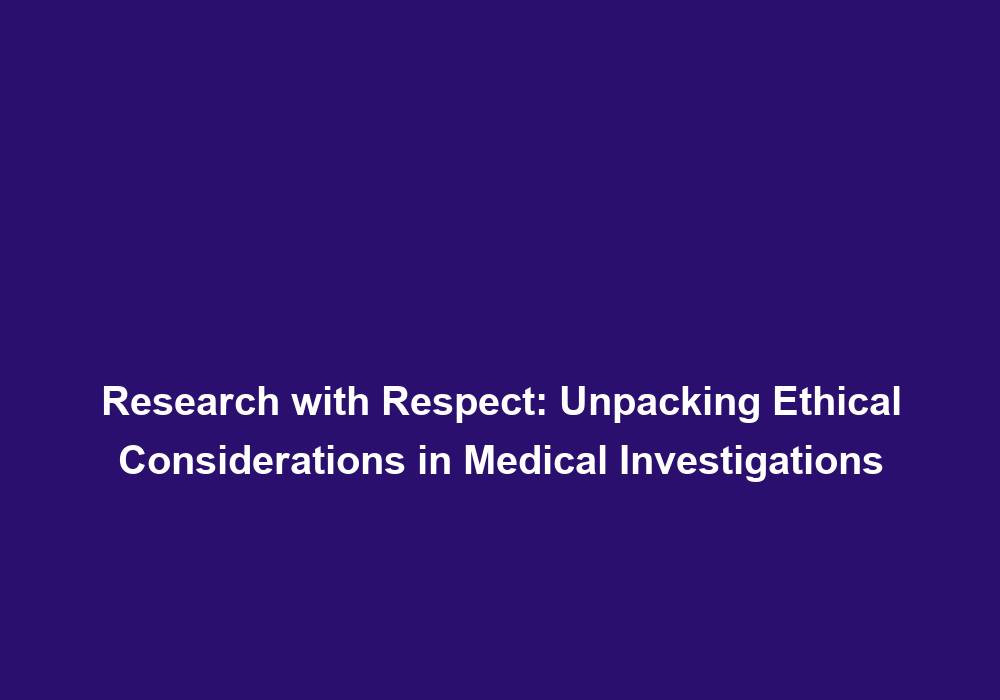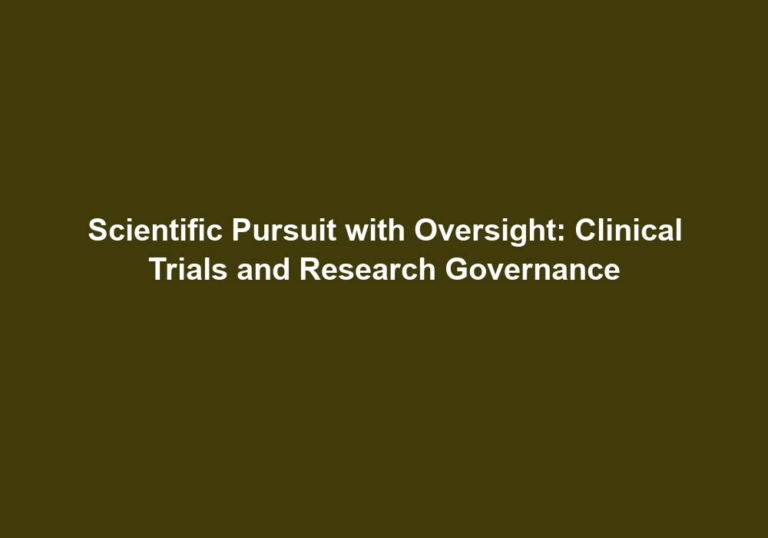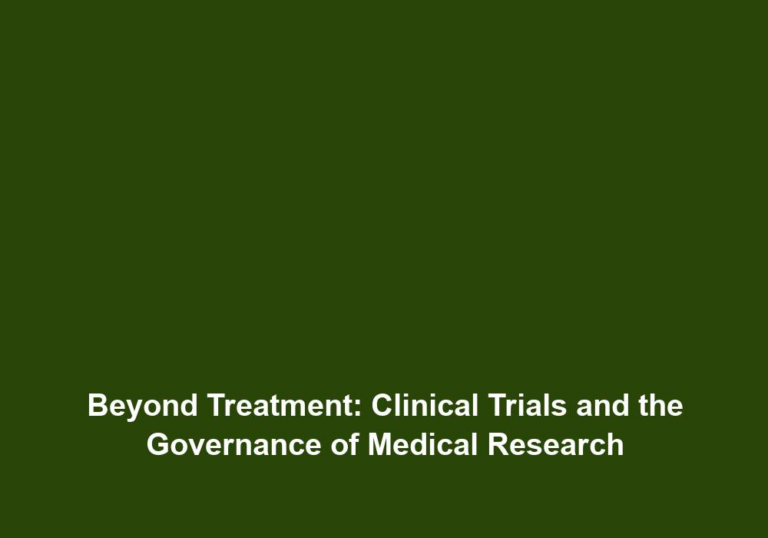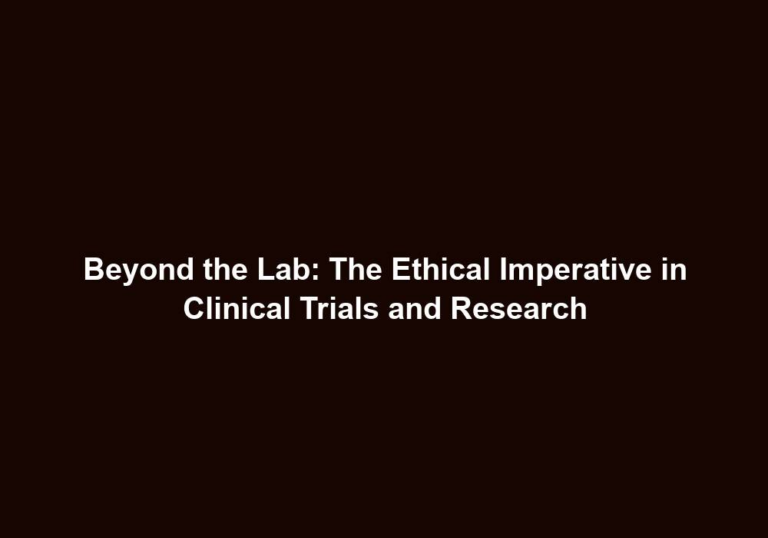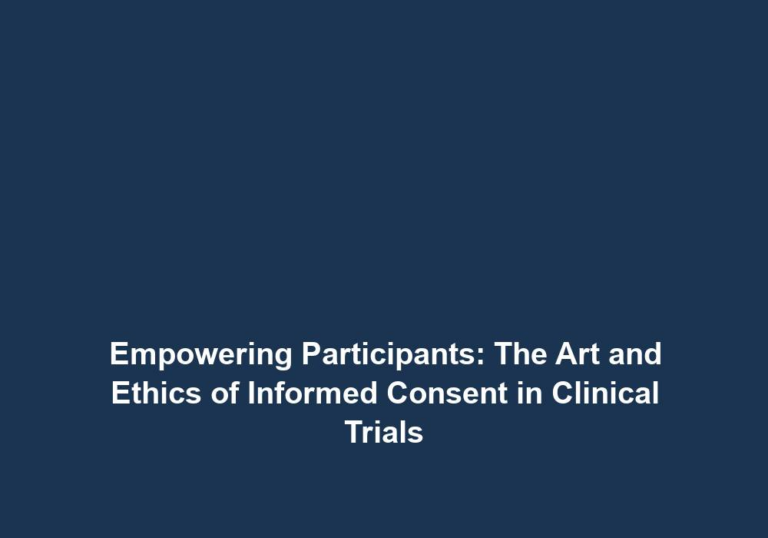Research with Respect: Unpacking Ethical Considerations in Medical Investigations
Introduction
As medical advancements continue to reshape the healthcare landscape, ethical considerations play a crucial role in ensuring that research and investigations are conducted with utmost respect and integrity. In this article, we will delve into the various ethical considerations that need to be taken into account when conducting medical investigations. By understanding and implementing these ethical principles, we can foster a culture of responsible research and contribute to the betterment of society as a whole.
Medical investigations involve human subjects who place their trust in researchers and healthcare professionals to prioritize their well-being. Ethical considerations in this context are not merely a formality, but an essential aspect that upholds the dignity, rights, and safety of individuals participating in research studies. By adhering to ethical guidelines, medical investigations can maintain the trust of participants and ensure the accuracy and reliability of the findings.
Importance of Ethical Considerations in Medical Investigation
Ethical considerations hold significant importance in the field of medical investigation. They serve as the foundation for ensuring the protection and well-being of research participants. By integrating ethical principles into the research process, the trust between participants and researchers is strengthened, leading to more accurate and reliable findings.
Ethical guidelines help researchers navigate the complex terrain of medical investigations, ensuring that the rights and dignity of participants are respected. By prioritizing the well-being of individuals involved in research studies, ethical considerations not only safeguard the participants but also contribute to the overall integrity and credibility of the research.
The integration of ethical considerations in medical investigations also fosters a culture of responsible research. It encourages researchers to evaluate the potential risks and benefits of their studies and make informed decisions that prioritize participant safety. Furthermore, ethical considerations promote transparency, accountability, and the responsible use of participant data.
Informed Consent: Foundation of Ethical Research
One of the fundamental pillars of ethical medical investigation is obtaining informed consent from participants. Informed consent ensures that individuals understand the purpose, risks, benefits, and potential outcomes of the research study before deciding to participate. Researchers must provide clear and comprehensive information, allowing participants to make an informed decision without any coercion or manipulation.
Informed consent goes beyond obtaining a signature on a form. It involves a process of open communication between the researcher and the participant. This process should include an explanation of the study objectives, procedures, potential risks, expected benefits, alternative treatments, and the right to withdraw from the study at any time.
Researchers must also consider the participants’ capacity to provide informed consent. In cases where individuals may have limited decision-making capacity, such as children or individuals with cognitive impairments, additional measures must be taken to ensure their rights and well-being are protected. This may involve obtaining consent from legally authorized representatives and ensuring that the research is justified and necessary for their well-being.
Confidentiality and Privacy
Respecting the confidentiality and privacy of research participants is of utmost importance. Medical investigations often involve the collection of personal and sensitive information, which should be handled with strict confidentiality. Researchers must ensure that participant data is anonymized and stored securely to prevent unauthorized access. By safeguarding participant privacy, researchers honor their trust and prevent any potential harm that may arise from the misuse of personal information.
Confidentiality measures should include appropriate data protection protocols, such as encryption, restricted access, and secure storage. Researchers should clearly communicate to participants how their data will be collected, used, and protected throughout the study. This transparency builds trust and reassures participants that their privacy is a top priority.
It is crucial to note that confidentiality is not absolute. There may be circumstances where researchers are legally obligated to disclose participant information, such as in cases of suspected abuse or imminent harm. In such situations, researchers must clearly communicate these exceptions to participants during the informed consent process.
Ethical Review Boards: Guardians of Research Ethics
To ensure that medical investigations adhere to ethical standards, many institutions have established Ethical Review Boards (ERBs) or Institutional Review Boards (IRBs). These boards consist of experts from various disciplines who review research proposals and protocols to determine their ethical soundness. Researchers seeking approval for their investigations must submit detailed plans, addressing ethical considerations such as participant safety, informed consent procedures, and potential risks and benefits. ERBs play a critical role in safeguarding the rights and well-being of research participants.
The primary function of Ethical Review Boards is to assess the ethical implications and potential risks associated with research studies. These boards evaluate the study design, methodology, participant recruitment process, and data management procedures to ensure that the research is conducted ethically and with the utmost respect for participants.
By involving ERBs in the research process, researchers benefit from expert guidance and feedback to enhance the ethical rigor of their investigations. This external review process helps maintain the integrity and validity of research findings and ensures that the rights and well-being of participants are protected.
Balancing Risks and Benefits
Ethical medical investigation requires a careful balance between potential risks and benefits. Researchers must assess the potential benefits of the study against the risks participants may face. It is crucial to minimize risks and ensure that the potential benefits outweigh the harm or discomfort that participants might experience. This assessment should be conducted transparently and communicated effectively to participants during the informed consent process.
Risk-benefit analysis involves considering various factors, such as the study’s scientific importance, the likelihood and severity of potential harms, and the potential benefits to society. Researchers should take steps to mitigate risks through proper study design, participant monitoring, and access to necessary medical care. This ensures that participants are not exposed to unnecessary harm and that the study’s potential benefits are maximized.
By transparently communicating the risks and benefits to participants, researchers empower them to make informed decisions about their participation. Transparency also helps build trust and fosters a collaborative relationship between researchers and participants, further enhancing the ethical conduct of medical investigations.
Vulnerable Populations
Certain populations, such as children, pregnant women, and individuals with cognitive impairments, are considered vulnerable and require additional protection in medical investigations. Special ethical considerations must be applied when involving these populations in research, including obtaining informed consent from legally authorized representatives and ensuring the research is justified and necessary for their well-being.
When conducting research involving vulnerable populations, researchers must prioritize their safety and well-being. This may include additional safeguards, such as independent advocacy and oversight, to ensure that the rights and interests of the participants are protected.
Informed consent processes for vulnerable populations may involve additional considerations, such as simplified language, visual aids, or alternative communication methods, to facilitate understanding. Researchers must also be mindful of potential power imbalances and ensure that participants are not coerced or unduly influenced to participate in the study.
Transparency and Reporting
Maintaining transparency in research practices is essential for maintaining ethical standards. Researchers should disclose any potential conflicts of interest, funding sources, and affiliations that may influence the research study. Additionally, the accurate and timely reporting of research findings, irrespective of whether the outcomes are favorable or unfavorable, is crucial for the advancement of medical knowledge and the prevention of biased reporting.
Transparency in research practices helps build public trust and confidence in the scientific community. It allows for independent scrutiny of the methods and findings, promoting accountability and the replication of studies. By providing access to complete and accurate information, researchers contribute to the collective knowledge base and enable evidence-based decision-making in healthcare.
Timely reporting of research findings is equally important. It ensures that the scientific community and healthcare practitioners have access to the latest information, allowing them to make informed decisions and provide the best possible care to patients. Delayed or selective reporting can lead to biased interpretations and hinder the progress of medical knowledge.
Compliance with Regulatory Standards
Medical investigations are subject to various regulatory standards at national and international levels. Researchers must ensure compliance with these standards and regulations to uphold ethical principles. Regulations may cover various aspects, including participant protection, research procedures, data collection and management, and ethical review processes. By adhering to these regulations, researchers can contribute to the credibility and reliability of their investigations.
Regulatory standards provide a framework for ethical conduct in medical investigations. They help ensure that research is conducted with integrity, transparency, and the highest regard for participant safety and well-being. Compliance with these standards also helps protect researchers from potential legal and ethical liabilities.
Researchers should familiarize themselves with the relevant regulatory requirements and seek guidance from ethics committees, legal experts, and institutional policies. By proactively addressing regulatory considerations, researchers can navigate the ethical complexities of medical investigations and contribute to the advancement of scientific knowledge.
Conclusion
Ethical considerations in medical investigation are paramount to protect the rights, well-being, and privacy of research participants. By obtaining informed consent, respecting confidentiality, involving vulnerable populations with care, and maintaining transparency, researchers can conduct investigations that have a positive impact on society. Adhering to regulatory standards and seeking ethical review board approvals further ensures the integrity and validity of research findings. Ultimately, conscious efforts to unravel the ethical dimensions of medical investigations contribute to the advancement of quality healthcare and a better understanding of human health.

